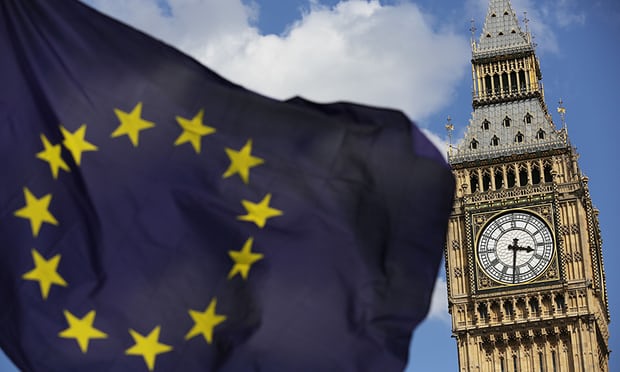Organisations representing up to 3 million EU citizens living in the UK and digital rights activists have written to the home secretary, Amber Rudd, giving notice that they will take legal action if a clause in the data protection bill is enacted.
The threat is aimed at proposals in the bill to introduce an exemption for immigration information. It is claimed that the clause would prevent those facing deportation from obtaining and challenging the accuracy of personal data held on them by the government.
The two groups – the3million, a grassroots organisation representing EU citizens living in the UK, and the Open Rights Group (ORG), which campaigns on privacy rights and free speech online – argue that the clause in the bill breaches the government’s obligations under the EU’s general data protection regulation (GDPR).
The bill will be debated in parliament on Monday. Rosa Curling, a human rights solicitor from law firm Leigh Day, which is acting on behalf of the3million and ORG, said: “The immigration exemption creates a discriminatory two‐tier system for data protection rights. The clause is incompatible with GDPR, as well as EU law generally and the European convention on human rights.
“If the exemption is made law, our clients will apply for judicial review. They have written to the government today to urge it to reconsider and to remove the immigration exemption from the bill without further delay.”
Jim Killock, the ORG executive director, said: “This is an attempt to disguise the Home Office’s mistakes by making sure that their errors are never found. When people are wrongly told to leave, they would find it very hard to challenge.
“Data protection is a basic safeguard to make sure you can find out what organisations know about you, and why they make decisions. Sometimes, during criminal investigations, that isn’t appropriate, but immigrants aren’t criminals, nor should they be treated as such.”
Nicolas Hatton, the chairman of the3million, said: “The UK government has proposed setting up a new registration system for EU citizens after the UK leaves the EU, and this will potentially create a database with the personal details of over 3 million people.
“We need safeguards in place to ensure that these citizens have access to the information held about them, so they are able to appeal [against] Home Office decisions or correct mistakes. Everyone should be entitled to know how the Home Office and other government agencies are using their records, and that is why we want this exemption removed.”
The Labour MEP Claude Moraes, who chairs the European parliament’s civil liberties, justice and home affairs committee, is opposing the bill. “What is happening here is that the UK government, under the cover of the complexity of data protection law in particular, and its chaotic Brexit negotiations in general, is seeking to create damaging new discriminatory national immigration restrictions,” he has said.
Immigration caseworkers have said that if clients can no longer access their Home Office files they will never discover why a residency application has been turned down and will be unable to challenge administrative mistakes, the Guardian reports.
A government spokesperson said: “The bill carefully balances protecting people’s data rights and the wider interests of society including making sure day-to-day operations relating to immigration controls are not obstructed. There are no blanket exemptions: any restrictions will need to be justified on a case-by-case basis with oversight from the Information Commissioner’s Office and the courts.”
More about: #Immigration
















































